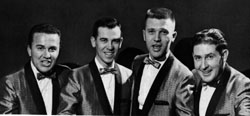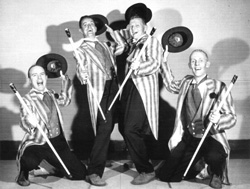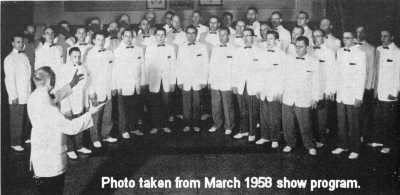


 Mark Roberts |
The midwinter convention of the Society was held in Denver, Colorado, on January 27-28, 1956. Two major decisions were reached at this conclave which affected the Michigan District membership. The first was the announcement by International Treasurer Mark P. Roberts of the Grosse Pointe Chapter that after a year of negotiation with the Internal Revenue Department, the Society was now classified not only as a fraternal organization, but also as a charitable, literary, and educational organization. This change meant that contributions made to the Society were deductible by the donors in computing their taxable income in the usual manner prescribed by law. Bequests, legacies, devises, or transfers to the Society for its use were also deductible in computing the value of the taxable estate of a decedent for Federal Estate purposes. The district and the Society owe a tremendous amount of gratitude to Mark Roberts for this tremendous accomplishment, because today our tax-exempt status can be traced directly to Mark's efforts.
Headquarters moved out of Detroit:
The second decision was the result of the report of the International Building Committee which had been researching the suitability for a permanent headquarters site and had narrowed their choice to four—Detroit, Kansas City, Tulsa, and Chicago, which it considered most eligible. After studying the committee's ratings and listening to presentations by the representatives of the four cities, the Board voted the Chicago area as the best suited from a standpoint of service to the Society as a whole. The Chicago chapters had submitted a proposal to purchase an abandoned schoolhouse in LaGrange, Illinois, a suburb of Chicago, to be used until such time as a new building could be erected. The Board voted to buy the schoolhouse, provided all suitable financial considerations could be worked out and with the approval of the full International Board. Detroit, which had been the site of the international headquarters since 1942, put on a tremendous presentation of facts and figures in substantiating their case for keeping the headquarters in Detroit. Bill Bond, the president of the Detroit Chapter, prepared an excellent presentation to the Board, all to no avail. Bond's clinching argument for maintaining Detroit as the site stated; "14,588 or 58.8 percent of all barbershoppers—352 or 59 percent of all chapters—11 or 78.5 percent of all districts are within 500 miles of Detroit. They are within a day's travel, a few hours by plane. They are within a day's postal service. They can phone headquarters for a $1 or less." There was much more to the Bond report, 100 pages, including a big brochure from the Detroit Board of Commerce, as well as his own, listing hundreds of details. Despite his sterling appeal, the Board, as it is wont to do, decided otherwise.
At this same meeting, Columbus, Ohio, was selected as the site of the 1958 convention and Pittsburgh was awarded the 1957 midwinter meeting. In addition, it was determined by a survey of the society's overall membership as of December 31, 1955, that Michigan would be entitled to three quartets in the upcoming international contest.
New district constitution imposedThe action of the International Board at the midwinter meeting in Denver provided for a standard form of constitution to be imposed upon all districts with instructions that each district's by-laws be rewritten or amended to comply, did not meet with unanimous approval in the ranks of the Michigan By-laws Committee. Harold Sepull of the Dearborn Chapter, who had worked hard for the previous two years in attempting to provide his district with a new set of regulations, took exception to the mandate. His objections were based primarily on the `freedom' of districts to control their own destinies, a so-called "states rights versus federal rights" sort of situation. He stated more time was needed before the district met in April to integrate the changes and to properly inform members and officers.
The Boyne City "Bush League" quartet contest was held on March 24 in the Boyne City High School with the BEACONAIRES of Muskegon taking top honors. The INCIDENTALS of Kalamazoo came in second in one of the most hotly contested competitions in the ten-year history of the event. Six other quartets were entered in the contest with a tremendous show afterwards at the Dilworth Hotel.
Cadillac hosted April international quartet preliminariesThe international preliminary quartet contest and district meeting took place in Cadillac on April 27-28, 1956. A total of nine quartets took part in the regional staged under the auspices of the Cadillac Chapter. Selected to be the Michigan representatives at international were the EXTENSION CHORDS (Sid Helder, tenor; Carl VerDuin, bari; Don Hall, bass, and Don Lucas, lead) of Grand Rapids, the TREBLE MAKERS (Reddick, Rowell, Van Tassell, and Van York) of Detroit and the MERRI-MEN (Howard Hawkins, tenor; Dale Bullock, lead; Doug Stephens, bass, and Gordon Washburn, bari) of Lansing. The ONCHORDS of Saginaw were named as the alternate quartet. Other quartets competing included the PARADUETS of Muskegon, the AIRE-TONICS of Muskegon, the BEACONAIRES of Muskegon, the SOLITAIRES of Bay City and the TUNE GRINDERS of Detroit.
At the district meeting held at the Northwood Hotel in conjunction with the contest, officers were elected including Lou Harrington for his second term as president, Halley Dion, Paul Kernen and Ray Leatz as vice presidents, John W. Klaiber, treasurer and Seaborn F. Lawrence, secretary. Despite objections mentioned previously, a motion by Mark Roberts to accept the new constitution was adopted. Duane Mosier of the Northwest Detroit Chapter moved that a resolution be prepared urging the International Board to reconsider its proposed move of the international headquarters out of the Detroit area. Treasurer Klaiber reported a balance of $2,742.49 in the treasury, and Membership VP Halley Dion reported a membership of 1,693 as of last December 31. Although the district had contributed to the quartets representing Michigan in international competition for the past few years, it was decided to establish a regular fund for this purpose on a voluntary basis of $2.00 per chapter member.
 MERRI-MEN |
Treble-Makers |
The international convention and contests were held in Minneapolis June 13-17, 1956. The CONFEDERATES reigned as the quartet champions, with only one quartet from Michigan, the MERRI-MEN from Lansing, reaching the finals. The MERRI-MEN worked their way into the final 15 and with nine other quartets failed to collect enough points to qualify for a medallion position. The other two Michigan quartets, the TREBLE-MAKERS of Detroit and the EXTENSION CHORDS of Grand Rapids missed out in their first trials and failed to qualify for the finals. However, the performances of the Michigan lads were noteworthy. The record shows that the MERRI-MEN finished fourteenth after 40 had gone the first round. The TREBLE-MAKERS stood sixteenth, just one place away from qualifying, and the Grand Rapids four attained seventeenth. Less than 36 points separated the three quartets, and out of 2000 points the results were not too discouraging.
Michigan's district champion chorus, the GREAT LAKES of Grand Rapids, winner of the first chorus contest ever, failed to place in the 1956 competition won by the Michigan City, Indiana, Chorus under the direction of Rudy Hart. The boys from the furniture city under the direction of Bob Weaver sang well enough, but their marching on and off the stage left much to be desired. Apparently this was one of the judging criteria in those days.
The International Board in their meetings at this convention, while not backing away from their decision to move the international headquarters, did agree with Michigan's Duane Mosier. He had made a plea at this convention not to move the headquarters, but rather lease another building in Detroit for at least another year for temporary quarters. In other actions, the International Board was increased to 22 members, adding two additional vice presidents to the Board of `equal rank', and 15 directors. This move came at the behest of a Michigan proposal to add 14 new seats on the Board to give each district at least one representative. However, the allowing of districts to each have a representative was ignored. Rowland E. Davis of New York was elected president of the Society for 1956-57. His first committee appointments involving Michigan men were Joe Jones of Detroit who was appointed to head the important Contest and Judges Committee, Willis Diekema the Special Song Arrangement Committee, Mark Roberts as vice-chairman of Finance Committee and member of the Laws and Regulations Committee, and Bill Otto, assistant secretary, as the new chief of the decrepits.
Fund set up for choruses and quartets attending the international contestsThe District Executive Board in a meeting on July 28, 1956, in South Haven, took a definite step toward financing the travel expenses of its quartet and chorus representatives at all future international contests. The Board created a new fund, set a quota and provided for custody and disbursement of the fund, known as the `international contest fund.' As finally set up, the new fund will be made up by contributions from the various chapters, with the quota set as $2 per member with the assessment coming from shows, special parties, etc. Other actions taken by the Executive Board at this meeting included the setting up of new rules governing the conduct of district chorus contests beginning with the next contest in Bay City on October 6. Under the plan adopted, the contest was open to any chorus, no matter how proficient or how small, to compete for district titles in their own class. The three championship designations set up included the `international finalist,' the chorus to represent the district in the international contest, the second being the "district champion" chorus which was to be the chorus scoring the highest number of points, and the third being a "junior championship" open to all choruses never having won a district or international championship. Once a chorus had won either of the two district awards, it would not be eligible to compete for the same title for two years after winning the award. The rules adopted came about as the result of a lengthy discussion seeking to find a way to equalize the competition for choruses for the district contest and at the same time permit the district to select an adequate chorus for the international assignment. A committee made up of Ray Leatz of the Fruit Belt Chapter, Frank Tiggleman of Grand Rapids and Halley Dion of Muskegon presented the plan which was adopted.
John Hill of the Lansing Chapter, who was the chairman of the District Song Selection Committee, named "Red River Valley" as the Michigan 1957 song of the year. Cecil H. Fischer of the Grand Rapids Chapter was awarded the Area Counselor of the Year Award for 1956. The Muskegon Chapter won the 1955-56 Achievement Award in the senior division and the Boyne City Chapter in the junior division. Seaborn Lawrence, who was the chairman of the Achievement Committee, made the announcement.
AIRE-TONICS proclaimed new district quartet champions Aire Tonics |
At the district contest held in Bay City on October 6, 1956, the AIRE-TONICS of Muskegon (Bill Wickstrom, tenor; Gerry Guimond, lead; Clare Bristol, bass; and Tom Damm, baritone) were proclaimed the district quartet champions. In second place were the FOUR-BEARERS OF HARMONY, a new Detroit quartet that edged out the BEACONAIRES of Muskegon by a mere two points. The closeness of the contest was remarkable when it is considered that it required close to 1600 points to qualify for second. In fourth place were the CAR TUNES from the Northwest Detroit Chapter, also a new quartet. By virtue of their showing, the CAR TUNES were rated the novice champions for 1956-57.
In the chorus competition the Grand Rapids GREAT LAKES Chorus under the leadership of Robert Weaver had little trouble outsinging the other four competitors. They were the PORT CITY Chorus of Muskegon directed by Al Burgess, the FRUIT BELT Chorus from Benton Harbor directed by William Hansen, the Jackson Chapter Chorus directed by George V. Crippen and the Gratiot County Chorus under the leadership of Phil Daab.
 Fruit Belt "57" |
To the Muskegon chorus went the title of Michigan District champions for 1956-57. The award was made under the new rules which prevents choruses who have won a district championship during the last three years from competing. The FRUIT BELT Chorus won the junior championship. The Grand Rapids chorus which had won the international in 1952, by virtue of their Bay City showing, won the right to represent the district at the international contest scheduled for Los Angeles in 1957.
It was announced in Detroit by President Lou Harrington that for the fourth straight year membership in the Michigan district has gone upward. As of November 1, according to figures released at international headquarters, Michigan had 38 chapters and 1,703 members. As of December 31, 1955, the Wolverine district had 36 chapters and 1693 members. The big four chapters in the district at the time were Muskegon, 146 members; Dearborn, 130 members; Grand Rapids, 110 members and Detroit, 104.
| [index] | [1956] | [1957] | [1958] | [1959] | [1960] | [Contents] |